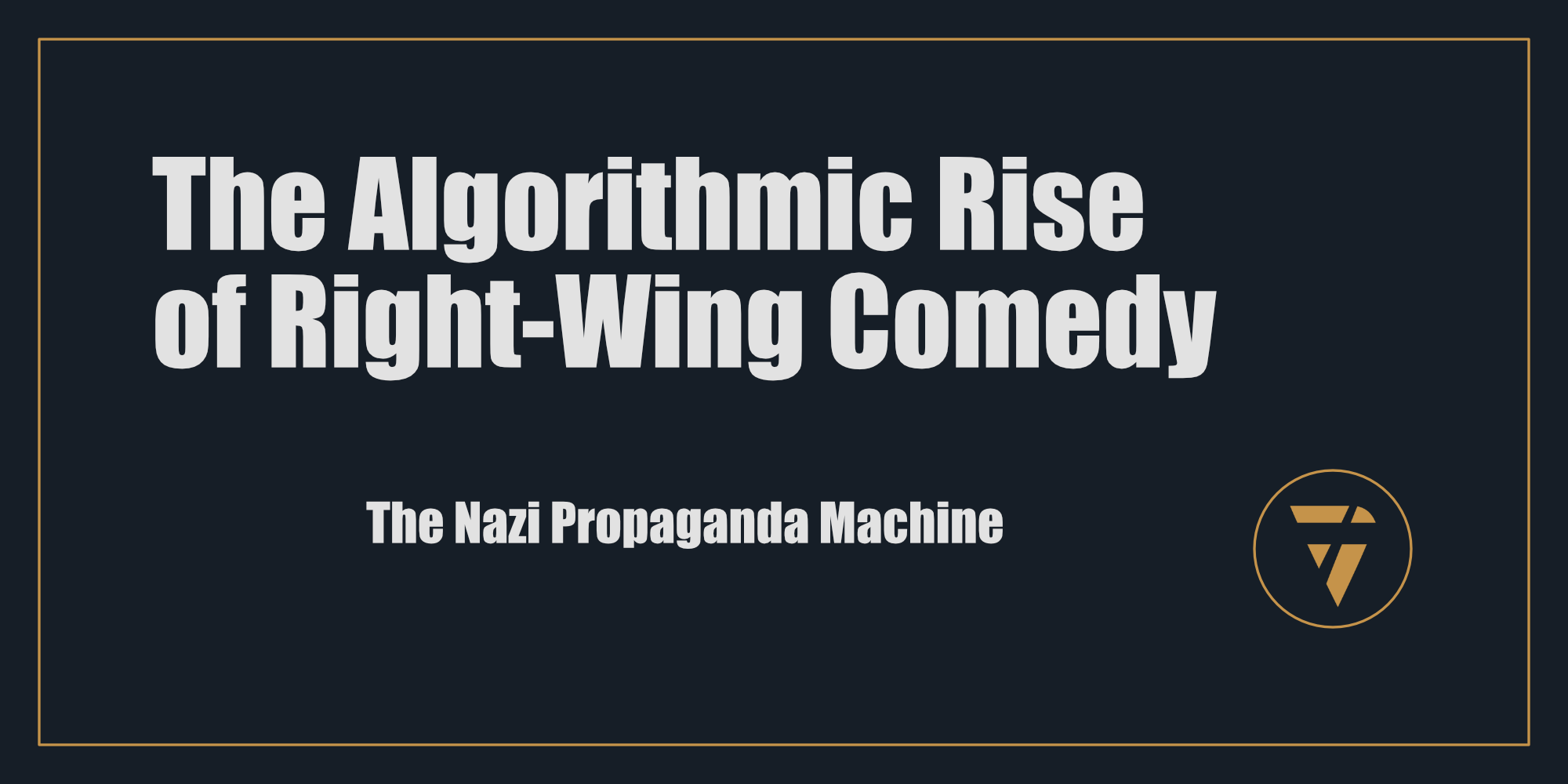The Algorithmic Rise of Right-Wing Comedy

The Nazi Propaganda Machine
Comedy has long been a potent tool for shaping cultural and political landscapes. From the sharp critiques of court jesters to modern stand-up acts, humour can challenge authority, expose hypocrisy, and foster solidarity. However, comedy can also be weaponized to reinforce ideologies, normalize prejudice, and manipulate public sentiment. Today’s rise of right-wing comedy, as described by James Adomian, presents an unsettling parallel to the way the Nazis leveraged humour in World War II-era Germany.
(Did a lot of press interviews at the end of last year for my standup special. There was a particular statement made, that all the entertainment websites decided was not newsworthy - they were obviously right! But why not just bluesky it, right? I don’t think any publicists are here yet …)
— “james adomian” (@jadomian.bsky.social) 2025-02-20T13:13:43.342Z
These are the mechanisms behind the ascendance of modern right-wing comedy, the new Nazi comedic propaganda. It examines how this movement uses humour to entrench power, build in-group solidarity, and marginalize opposition, while benefiting from state or corporate-backed media ecosystems.
The Infrastructure of Right-Wing Comedy: Funding, Algorithms, and Gatekeeping
Adomian points out that contemporary right-wing comedy is not a grassroots movement—it's a product of deliberate, well-funded promotion. Tech billionaires, finance moguls, and political operatives have created an infrastructure that amplifies conservative comedians across digital platforms. Through YouTube algorithms, podcast networks, and social media botnets, right-wing "humour" is presented as dominant and culturally significant, despite often being formulaic, derivative, or outright reactionary.
The Nazis used a similar model. While Germany’s Weimar Republic had a thriving satirical and leftist comedic tradition, the Third Reich systematically dismantled it. Jewish, communist, and other dissenting voices were purged, replaced by an "approved" comedic framework that ridiculed enemies of the state and reinforced Nazi ideology. Just as today’s tech-driven platforms suppress certain viewpoints through algorithmic manipulation, the Nazis controlled state-run radio, film, and print media to elevate propagandistic humour.
The Themes: Clapter, Victimhood, and Punching Down
Modern right-wing comedy frequently relies on "clapter"—a phenomenon where audiences respond to statements of ideological agreement rather than genuine wit. Right-wing comics reinforce grievances, attacking the "woke mob," immigrants, feminists, and other marginalized groups. They frame themselves as victims of political correctness, despite occupying privileged positions with financial backing.
Nazi comedy followed the same pattern. Nazi-approved cabaret, film, and radio sketches mocked Jews, socialists, and intellectuals while framing the German people as unfairly persecuted. The Nazis used humour to depict Jews as corrupt, grotesque, and dangerous, justifying their marginalization and eventual extermination. Today, right-wing comedians use humour to portray liberals, trans people, and immigrants as threats to Western civilization. While modern comparisons should be made carefully, the mechanisms remain eerily similar.
The Illusion of Counterculture: Rebellion from the Seat of Power
Both Nazi humour and today’s right-wing comedy cultivate an illusion of rebellion. Despite being aligned with powerful entities, they market themselves as “dangerous” and “banned.” Elon Musk and other billionaire backers promote comedians like Joe Rogan and Andrew Tate as daring truth-tellers, even as their content is pushed to millions by algorithmic favouritism.
During the Third Reich, Nazi humorists similarly framed themselves as subversive voices, despite their total alignment with the regime. Anti-Semitic films like Jud Süss were presented as brave exposés rather than state propaganda. The modern right-wing comedy ecosystem employs the same deception—framing progressive comedians as establishment shills while casting themselves as defiant underdogs, even when they dominate digital spaces.
The Marginalization of Leftist and Progressive Humour
Adomian argues that leftist comedians face systemic suppression, and history supports this claim. In Nazi Germany, left-wing satire was systematically eliminated. Cabaret performers, journalists, and playwrights who criticized the regime were arrested, exiled, or executed. The space for comedic dissent was erased.
In today’s digital landscape, progressive comedy does exist, but struggles against financial and algorithmic suppression. Unlike right-wing comics who enjoy the support of billionaires and corporate media executives, left-wing comedians are largely independent, relying on live performances, crowdfunding, and niche platforms. The result is a cultural asymmetry: right-wing comedy appears dominant not necessarily because it is more successful, but because it is better funded, and strategically amplified.
The Dangers of Normalization
Comedy is often dismissed as harmless, but history proves otherwise. In Nazi Germany, humour desensitized people to atrocity. It made dehumanization palatable. Cartoons, radio skits, and cabaret acts softened the impact of violent policies by masking them in laughter.
Today, right-wing comedy functions similarly. It primes audiences to accept regressive policies by ridiculing the people those policies harm. It reframes reactionary politics as common sense, and makes cruelty entertaining. While it may seem like mere jokes, the ideological conditioning it fosters is profound.
Not Funny Nazis
The parallels between Nazi-era comedic propaganda and the current right-wing comedy ecosystem are stark. Both rely on financial backing, algorithmic manipulation, and gatekeeping to manufacture cultural dominance. Both reinforce victimhood narratives, while maintaining institutional power. Both use humour as a means of normalizing exclusionary and authoritarian politics.
Understanding these patterns is crucial. Humour is a powerful force, capable of challenging power or entrenching it. As Adomian suggests, progressive comedians are still in the fight, but they are playing catch-up in a rigged game. The future of comedy—and perhaps democracy—depends on recognizing these dynamics and countering them with both sharper wit, and strategic resistance.
This is what I’m working on. Tell me what you think, I enjoy the conversation! Subscribe and follow the work in real time.
Thanks!
B

Right-wing comedy today isn’t grassroots—it’s a billionaire-funded algorithmic push, making mid-tier hacks seem like cultural icons. The Nazis did the same: erase leftist humour, fund state-approved ridicule, and call it rebellion. Same playbook, different century.
Funny how that works.
PS -






